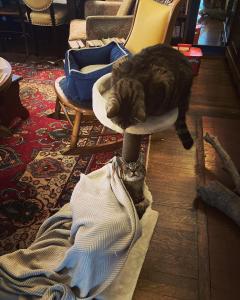I didn’t’ think it would ever happen, but the daily blank page did not factor into any of my intellectual or spiritual calculations for almost a month as I tried hard to think of other things. Of course, I didn’t think about those other things either in the usual tight circle of driving kids around this gray, desultory town and running loads of laundry. My blogging fast, rather than freeing up my mind to greater and more interesting thoughts, only hobbled me. I don’t think I know how to write anything anymore. But it’s Tuesday, so maybe the Internet will miraculously inspire me.
This, for example, is pretty depressing:
In the space of a couple of decades, Quebec became the region on the continent where religious practice was the weakest and where the largest proportion of couples lived out of wedlock. The birth rate fell from 30 per thousand when I was born to less than 10 per thousand today. The Catholic church lost all influence, to the point wherein the early days of the pandemic, the province’s bishops could not even get the premier’s office to return their calls.
The sudden and total rejection of Catholicism, it seems, is translating into a rejection of religion in general:
This rapid and revolutionary shift, with huge effects from high in the political sphere down to Quebecers’ intimate lives, is in large part behind the province’s support for Bill 21, which forbids the wearing of religious symbols by certain public sector employees, including teachers. Remembering the abuses of all sorts committed by the priests, and forgetting all the good that they also did, people here have ousted Catholicism from the schools and deserted the churches. As they view it, they will not tolerate that other, foreign religions come in through the back door. In the words of Jean-François Lisée, an influential commentator, religious beliefs are all “founded on mythical stories and dogmas which we can easily demonstrate to be historical and scientific falsehoods.”
So anyway, today (or tomorrow if you like) is the Feast of the Holy Innocents, when church people—what shall we call them? Christians? Jesus Followers? Rubes? —celebrate the slaughter of the infants of Bethlehem by the thugs of Herod, that insecure and wretched king who unleashed his impotent rage on a seemingly insignificant town, and yet failed to achieve his own desires. The Savior of the perishing—including all those dead babies—had escaped to Egypt, for his time had not yet come. It would, though. All that death and ruin would eventually be gathered up by Jesus and taken to the grave to be trampled down and destroyed forever. And so, without feeling at all confused about it, Christians have marked both the birth of their Lord, and Rachel weeping for her children in the matter of a few days. The Lord of Heaven and Earth, the God who came to live with us, did not arrive in fullness of time just to strew presents and affirm the proclivities of humanity. He came to die because we die. He, who knew no sin, took on sin so that we could live and not die. It’s not a circle, it is a line from the throne of heaven into the grave and back out again, dragging us with him.
Given that staggering reality, the whole month of December while I wasn’t writing, I pondered to myself what a Christian’s duty ought to look like in a post-Christian society. The vestigial elements of the Christian feast remain—people get together on a particular day to eat their favorite foods and give each other a lot of presents. But the reasons for the feast are forgotten. The “celebration” could be taken up at any time. Why not the 28th? Or the 31st? Any day will do.
Moreover, for the kind of culture in which most of us now reside, because the day-to-day shape of life is increasingly disordered and filled with anxiety, when a person arrives on what was once a Christian Feast, I think the whole thing takes on a new and peculiar painful aspect.
First, because most people are rich enough to go out and get what they want when they want it, they don’t really have anything to look forward to. The “treat yourself” wellness religious expression of Self-Care means that if you were to deny yourself anything for any length of time (like all year until Christmas) you would be sinning against yourself. Your primary duty is to, under the disguisement of love, indulge yourself every moment of the day and into the long hours of the night. And so you had better eat what you want, and buy all the books and clothes you desire as soon as you are able. Enduring a prolonged sensation of lack—what was once called fasting—is wicked. Unhappily, however, no matter what anyone says about it, if you have had everything you want all through the year, Christmas, or any kind of celebration, won’t be satisfying.
Second, the secular “celebration”—which really looks more like consumption– forces a lot of people unwittingly to acknowledge a God they don’t like and don’t want to have anything to do with. Why are you giving out presents on December 25th if you don’t believe in Jesus? Because all the stores told you to and you always have. But still, it’s the day Christians have gotten together through the ages to mark the day God joined human nature to his divine one. Like the person who accidentally marries the emotional and spiritual equivalent of an angry or alcoholic or insert-your-favorite-generational-dysfunction-here parent, even though no one wants to bow the knee to a loving, self-sacrificing, just God, yet, in the rush and stress of the season, the world stumbles over into an angry bow. The stores shriek about Christmas cheer and I quietly pour myself another tumbler of eggnog.
Well, I guess I better go do some things. See you tomorrow!













